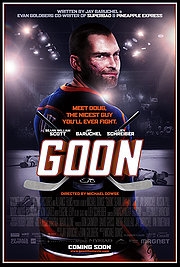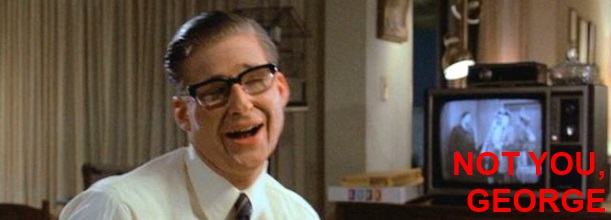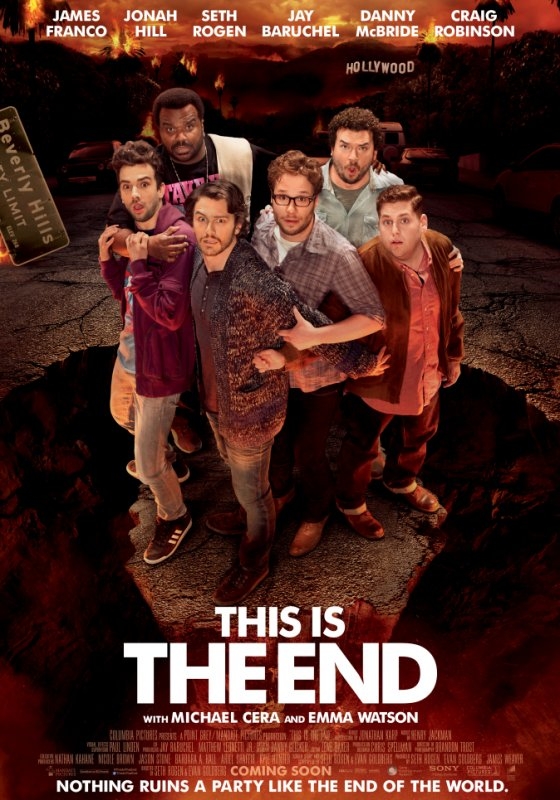Goon

Earlier this year, Derek Boogaard, a well-loved ice hockey player for the New York Rangers, died of an overdose aged twenty eight. An autopsy later revealed Boogaard had been suffering from Chronic Traumatic Encephalopathy, a degenerative brain condition caused by multiple head injuries (BFF bringing you the facts, people). It’s a condition seen most commonly in sportsmen and women who box, wrestle or – as in the case of Boogaard – play ice hockey. Unlike boxing or wrestling, however, violence isn’t necessarily the point in ice hockey. In this game, the gore comes on the side, much like a serving of blood-soaked onion rings livening up your boring old burger. In all seriousness, it’s a worryingly ubiquitous sight in the game: two players squaring up to one another, tossing their gloves and sticks down to indicate they wish to fight, and then exchanging blows. All while the crowd around them screams their approval.
Goon paints a picture – without, perhaps, delving too deeply into the ethical implications – of that violence through its lead character Doug Glatt (Scott), a bouncer with fists of iron and a heart of gold. The rather simple-minded Doug has never fit in with his academic family and jumps at the chance of joining a local ice hockey team as their “enforcer” (read: guy who punches everyone) after their coach spots him knocking someone unconscious. Doug quickly becomes a crowd favourite, earning himself the dubious moniker of “Doug the Thug”, and transfers to a team in Halifax. Here, he is tasked with protecting their star player Laflamme (Marc-André Grondin), psychologically damaged after a run-in with infamous veteran enforcer Ross Rhea (Liev Schreiber). Doug enjoys his new role, happily punching the crap out of anybody who challenges one of his team mates, and his popularity grows. Meanwhile, Doug meets and falls for Eva (Pill), a girl who digs ice hockey players and has a knack for cheating on her boyfriend. As the team progresses through the ranks, Doug steels himself for an encounter with Rhea, who is headed for retirement and planning on going out with a bang. Quite literally.
This is a comedy, certainly. It’s crammed full of jokes – veering from the crass to the farcical to the subtly satirical – a lot of which produce big laughs, some of which fall flat. But overall, Goon is edged by something verging on, dare I say it, seriouness, most likely inspired by true life cases of tragedy such as Boogaard’s. Luckily, the film straddles the shifting tones with a reasonable deftness; mostly down to Scott, in a performance so far from American Pie‘s Stifler that it’s almost hard to believe you’re watching the same actor. Somehow, despite Doug being characterised largely by his stupidity, Scott’s performance never feels patronising. It is, rather, a sweet, charming turn that occasionally really tugs at your heartstrings. Set perfectly against him is Alison Pill as his wry love interest Eva, a modern woman who likes to sleep around but feels a growing – and genuinely believable – attraction to the kind-hearted Doug.
The film builds to a satisfying, if predictable, climax – at which point you might find yourself covering your eyes if you take issue with, you know, BLOOD. But it then ends on a strange note, seeming to simultaneously celebrate and condemn the brutality of the game. We are obviously intended to feel for Doug, wincing every time he takes a punch. And yet, with the final flourish, we find ourselves rooting for our hero to punch everyone else’s lights out. It’s just not quite clear what the film’s intention is at its close. Does it matter? Not particularly. This is essentially, after all, a lighthearted comedy. And, at the end of the day, it might be a film exploring violence, but Goon has a surprisingly soft touch.








Recent Comments